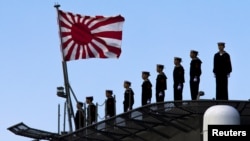While South Korea’s foreign minister’s visit to Tokyo Sunday may be a sign the two neighbors are working to ease tensions over World War II atrocities, some lawmakers in Seoul continue to take a hard line against Japan. The most recent bipartisan effort in Seoul’s National Assembly to denounce Japan is a resolution attempting to block Tokyo from adding any sites associated with its militaristic past to the list of World Heritage Cultural Sites.
Lee Won-wook, a member of the National Assembly with the opposition New Politics Alliance for Democracy Party sponsored a resolution to denounce and block Japan’s UNESCO application.
He said they define the Japanese government’s attempt to add to UNESCO’s World Heritage List as a diplomatic provocation act and they strongly condemn it.
UNESCO, The United Nations Educational, Scientific and Cultural Organization, is expected to render a decision this month [June] on Japan’s request to add 23 historic sites to its World Heritage List. These include coal mines, steel works and shipyards that exemplify how Japan became the first Asian nation to enter the modern industrial age from 1850 to 1910.
South Korea and China objected to Japan’s bid saying that it purposely distorts history after 1910 by ignoring the systematic human rights abuses that occurred at some of these sites during Japan’s military occupation and colonial rule over much of Asia.
South Korea’s Foreign Ministry claims that seven of the 23 sites were run as forced labor camps where over 57,000 Koreans worked and 94 workers died during Japan occupation of the Korean peninsula from 1910 to 1945.
Lee Yi-jae, a ruling Saenuri Party member of the National Assembly supports the resolution as a means to pressure leaders in Tokyo to face up to their history and make amends for past atrocities and abuse.
He said it is an effort to justify or beautify an ugly past.
War crimes
The conflict over this UNESCO bid is the most recent conflict to erupt between Tokyo and Seoul over perceived efforts in Japan to downplay past war crimes.
Perhaps the most egregious of the atrocities committed by Japanese soldiers, in the eyes of Koreans, has been the treatment of “comfort women.” The term refers to the thousands of women forced into prostitution to work in military brothels from the beginning of Japan’s colonial rule until the end of World War II.
Since she took office in 2013, South Korean President Park Geun-hye has refused to meet one-on-one with Japanese Prime Minister Shinzo Abe. She has demanded that the Japanese leader first directly address the comfort women issue and offer a sincere apology for past wartime abuse.
Prime Minister Abe has so far refused to apologize, but he has said he will uphold statements by past leaders that offered apologies for Japanese misconduct during the war. He also stirred the controversy when he visited a World War Two shrine that includes some Japanese war criminals.
Recently, however, President Park said in an interview that a resolution with Japan over these historical issues might be close at hand. This has lead to speculation that a compromise of sorts may be in development that is acceptable to both sides. Prime Minister Abe is expected to address this issue in a speech he will deliver in August on the 70th anniversary of the end of World War II.
Expectations
The trip to Tokyo by South Korean Foreign Minister Yun Byung-se, which will be the first such high-level visit in four years, is further raising expectations. While in Japan he will meet with his Japanese counterpart and attend a ceremony Monday marking the anniversary of a 1965 treaty normalizing bilateral ties.
Japan’s critics in South Korea’s National Assembly, like the Saenuri Party's Lee Yi-jae, are urging the foreign minister to take a strong stand on these historical grievances and specifically on Japan’s UNESCO bid.
The Northeast Asian neighbors are arguing over ownership of a chain of small islands called Dokdo in Korean and Takeshima in Japanese.
The tense relations between the two U.S. allies are complicating regional security cooperation to counter potential threats from North Korea and China.
S. Korea Lawmakers Condemn Japan’s UNESCO Bid
- By Brian Padden

SEOUL —




